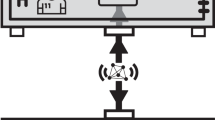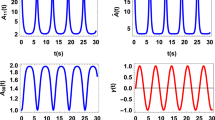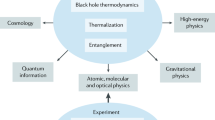Abstract
Quantum Darwinism describes the proliferation, in the environment, of multiple records of selected states of a quantum system. It explains how the quantum fragility of a state of a single quantum system can lead to the classical robustness of states in their correlated multitude; shows how effective ‘wave-packet collapse’ arises as a result of the proliferation throughout the environment of imprints of the state of the system; and provides a framework for the derivation of Born’s rule, which relates the probabilities of detecting states to their amplitudes. Taken together, these three advances mark considerable progress towards settling the quantum measurement problem.
This is a preview of subscription content, access via your institution
Access options
Subscribe to this journal
Receive 12 print issues and online access
$209.00 per year
only $17.42 per issue
Buy this article
- Purchase on Springer Link
- Instant access to full article PDF
Prices may be subject to local taxes which are calculated during checkout

 stored in
stored in  and its redundancy.
and its redundancy.


Similar content being viewed by others
References
Bohr, N. The quantum postulate and the recent development of atomic theory. Nature 121, 580–590 (1928).
Schrödinger, E. Die gegenwärtige Situation in der Quantenmechanik. Naturwissenschaften 23, 807–812; 823–828; 844–849 (1935).
Joos, E. et al. Decoherence and the Appearance of a Classical World in Quantum Theory (Springer, 2003).
Zurek, W. H. Decoherence, einselection, and the quantum origins of the classical. Rev. Mod. Phys. 75, 715–775 (2003).
Schlosshauer, M. Decoherence and the Quantum-to-Classical Transition (Springer, 2007).
Zurek, W. H. Pointer basis of a quantum apparatus: Into what mixture does the wavepacket collapse? Phys. Rev. D 24, 1516–1525 (1981).
Zurek, W. H. Environment-induced superselection rules. Phys. Rev. D 26, 1862–1880 (1982).
Paz, J.-P. & Zurek, W. H. in Coherent Atomic Matter Waves, Les Houches Lectures (eds Kaiser, R., Westbrook, C. & David, F.) 533–614 (Springer, 2001).
Zurek, W. H., Habib, S. & Paz, J.-P. Coherent states via decoherence. Phys. Rev. Lett. 70, 1187–1190 (1993).
Tegmark, M. & Shapiro, H. S. Decoherence produces coherent states: An explicit proof for harmonic chains. Phys. Rev. E 50, 2538–2547 (1994).
Gallis, M. R. The emergence of classicality via decoherence described by Lindblad operators. Phys. Rev. A 53, 655–660 (1996).
Ollivier, H., Poulin, D & Zurek, W. H. Objective properties from subjective quantum states: Environment as a witness. Phys. Rev. Lett. 93, 220401 (2004).
Blume-Kohout, R. & Zurek, W. H. A simple example of quantum Darwinism: Redundant information storage in many-spin environments. Found. Phys. 35, 1857–1876 (2005).
Blume-Kohout, R. & Zurek, W. H. Quantum Darwinism: Entanglement, branches, and the emergent classicality of redundantly stored quantum information. Phys. Rev. A 73, 062310 (2006).
Blume-Kohout, R. & Zurek, W. H. Quantum Darwinism in quantum Brownian motion. Phys. Rev. Lett. 101, 240405 (2008).
Zurek, W. H. Einselection and decoherence from an information theory perspective. Ann. Phys. 9, 855–864 (2000).
Born, M. Zur Quantenmechanik der Stossvorgänge. Zeits. Phys. 37, 863–867 (1926).
Wootters, W. K. & Zurek, W. H. A single quantum cannot be cloned. Nature 299, 802–803 (1982).
Dieks, D. Communication by EPR devices. Phys. Lett. A 92, 271–272 (1982).
Dirac, P. A. M. Quantum Mechanics (Clarendon, 1958).
Zurek, W. H. Quantum origin of quantum jumps: Breaking of unitary symmetry induced by information transfer and the transition from quantum to classical. Phys. Rev. A 76, 052110 (2007).
Ollivier, H., Poulin, D. & Zurek, W. H. Environment as a witness: Selective proliferation of information and emergence of objectivity in a quantum universe. Phys. Rev. A 72, 423113 (2005).
Nielsen, M. A. & Chuang, I. L. Quantum Computation and Quantum Information (Cambridge Univ. Press, 2000).
Everett, H. III. Relative state formulation of quantum theory. Rev. Mod. Phys. 29, 454–462 (1957).
Everett, H. III. The Theory of the Universal Wavefunction, Thesis, Princeton Univ. (1957).
DeWitt, B. S. & Graham, N. (eds) The Many-Worlds Interpretation of Quantum Mechanics (Princeton Univ. Press, 1973).
Landau, L. Das Dämpfungsproblem in der Wellenmechanik. Zeits. Phys. 45, 430–441 (1927).
von Neumann, J. Mathematical Foundations of Quantum Theory (Princeton Univ. Press, 1955).
Laplace, P. S. A Philosophical Essay on Probabilities (Dover, 1951).
Zurek, W. H. Environment-assisted invariance, causality, and probabilities in quantum physics. Phys. Rev. Lett. 90, 120404 (2003).
Zurek, W. H. Probabilities from entanglement, Born’s rule from envariance. Phys. Rev. A 71, 052105 (2005).
Auletta, G. Foundations and Interpretation of Quantum Theory (World Scientific, 2000).
Gleason, A. M. Measures on closed subspaces of Hilbert space. J. Math. Mech. 6, 855–893 (1957).
Zurek, W. H. Relative states and the environment: einselection, envariance, quantum Darwinism, and the existential interpretation. Preprint at <http://arxiv.org/abs/0707.2832> (2007).
Schlosshauer, M. & Fine, A. On Zurek’s derivation of the Born rule. Found. Phys. 35, 197–213 (2005).
Barnum, H. No-signalling-based version of Zurek’s derivation of quantum probabilities: A note on ‘Environment-assisted invariance, entanglement, and probabilities in quantum physics’. Preprint at <http://arxiv.org/abs/quant-ph/0312150> (2003).
Wheeler, J. A. in Complexity, Entropy, and the Physics of Information (ed. Zurek, W. H.) 3 (Addison Wesley, 1990).
Darwin, C. On the Origin of Species (John Murray, 1859).
Acknowledgements
I am grateful to R. Blume-Kohout, F. Cucchietti, J. P. Paz, D. Poulin, H.-T. Quan and M. Zwolak for stimulating discussions. This research was supported by DoE through an LDRD grant at Los Alamos, and, in part, by the Foundational Questions Institute (FQXi).
Author information
Authors and Affiliations
Corresponding author
Rights and permissions
About this article
Cite this article
Zurek, W. Quantum Darwinism. Nature Phys 5, 181–188 (2009). https://doi.org/10.1038/nphys1202
Received:
Accepted:
Published:
Issue Date:
DOI: https://doi.org/10.1038/nphys1202
This article is cited by
-
Spontaneous collapse models lead to the emergence of classicality of the Universe
Journal of High Energy Physics (2024)
-
The Metaphysics of Decoherence
Erkenntnis (2023)
-
A Unified Explanation of Some Quantum Phenomena
International Journal of Theoretical Physics (2023)
-
Social science goes quantum: explaining human decision-making, cognitive biases and Darwinian selection from a quantum perspective
Journal of Bioeconomics (2023)
-
One world is (probably) just as good as many
Synthese (2022)



